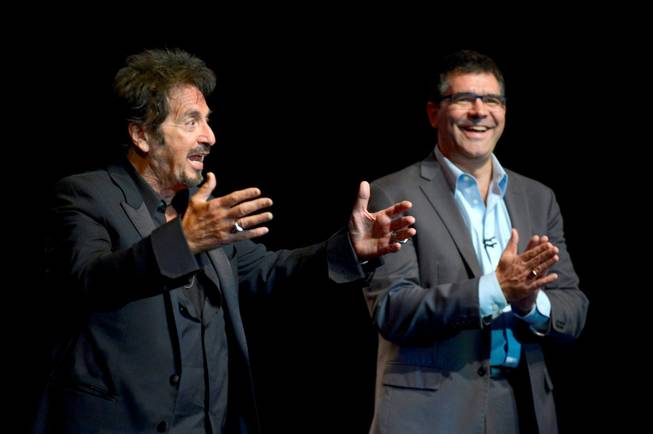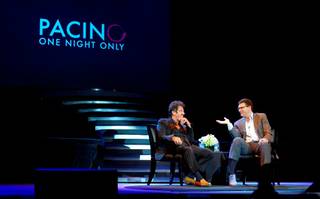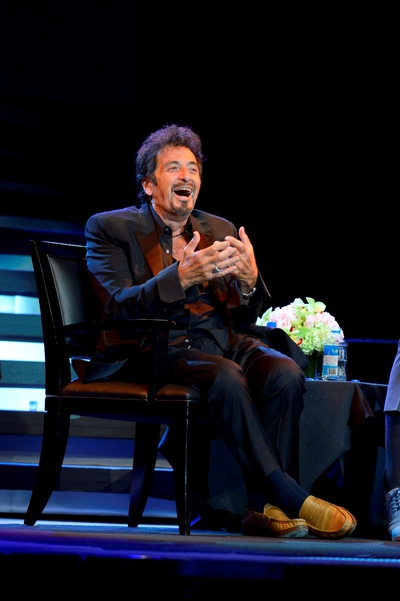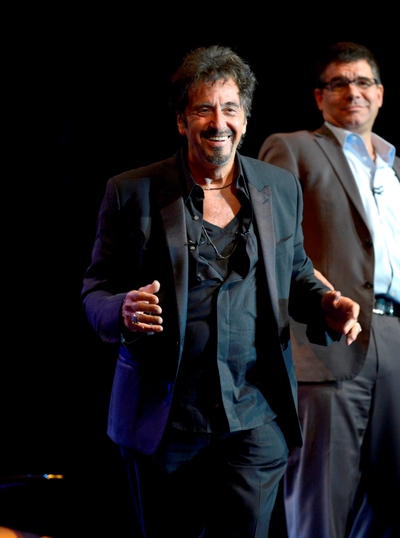
Bryan Steffy
Al Pacino and host John Katsilometes of the Las Vegas Sun on Saturday, Aug. 16, 2014, at the Mirage.
Published Sunday, Aug. 17, 2014 | 4:35 p.m.
Updated Monday, Aug. 18, 2014 | 10:37 a.m.
There is the moment when your eyes pop open, it is 3:17 a.m., and Jerry Orbach is peering down at you and shouting, “You need to try something else!”
But he is not shouting at you, really, but a movie camera. He is shouting at the character Harry Levine, played by Al Pacino, in the film “Chinese Coffee.” It is a powerful moment in a powerful movie starring Pacino, which he also directed and financed. It also is the rare powerful moment in a film starring Pacino in which Pacino does not physically appear.
But he is there, on the business end of this rant, having drawn the ire of his friend Jake Manheim, played by Orbach. Harry has pestered Jake into a critique of Harry’s latest book. Jake has said he has read the screed, but he has not, and finally snaps. He hasn’t read the book but doesn’t need to because he knows Harry’s work is recycled tripe.
“You need to try something else!” is that boiling point, and why you wake up thinking of that scene is difficult to understand unless you have spent the past two weeks watching Al Pacino films in the run-up to moderating and hosting the great actor’s appearance at the Mirage.
That happened Saturday night. You have to remind yourself of the days and dates because when you are asked to share a stage with Al Pacino, he is in your head — leasing space free of charge — until the moment this assignment ends.
You watch everything until your mind is filled with Pacino’s image. Pick any scene — the retrieval of the pistol in “The Godfather” when he blows away Virgil Sollozzo and Capt. McCluskey in the diner, the improvised shouting of “Attica!” in “Dog Day Afternoon” and the tango in “Scent of a Woman,” for which Pacino won an Oscar.
You are in conversation with someone very important, such as your mother, and your mind drifts to the thought, “Should I ask about ‘hoo-hah?’ or is that played out?” You wonder if he has ever been shot at, and if you can work that in, or if trudging into a talk about his sobriety is fitting fodder for a Saturday night audience on the Strip.
You meet him, finally, the afternoon of the show. The theater’s lights are dimmed but for the glow of the stage — two chairs and a table between, where a floral arrangement and two bottles of water have been placed. You are called to the middle of the theater, and there in the dark donning a black suit is Al Pacino. In silhouette.
“I’d hoped the lights would be on when you met,” says the show’s producer. “He’s more mysterious in the dark,” you say. You grab his hands, the same ones that assembled a .45 in a half-minute in “Scent of a Woman” and introduced “my little friend” in “Scarface,” and joke, “Welcome to the dinner show.”
He smiles, and there is a back-and-forth about the venue, which he has never even seen. He asks, “Who has played here?” You run through the list, the late Danny Gans, Lewis Black, Boyz II Men, Kathy Griffin, Seth Meyers, Daniel Tosh, Jay Leno, Martin Short … everyone you can think of you have seen on that stage. He stops and says, “Well, I am in good company.”
We are led to the seats onstage for a light and sound check, and you reassure him that you are up for this task, saying, “I have seen all the movies, all the clips. I’ve watched everything and studied you to exhaustion. We’ll be fine.”
He chuckles and says, “Well, I live in hope.” You answer, “Yeah, you and Bill Clinton. He’s from Hope.” And he nods and says, “Good line!” We will be fine, with his parting request, delivered with a grin, “Make sure you don’t take up all the light!” He sort of has nothing to worry about there.
We are ready to do the show at that very moment, but there is about a two-hour lag, and you are led to a dressing room(!), where a person who works for a production show in town asks if you need anything ironed or freshened up. “Yeah, my brain. Can you make that happen?” you answer.
For what seems forever, you sit and scan more data about Pacino. His interviews with Larry King. His appearance on “The Late Show,” where Kevin Spacey shows up and performs a spot-on impression of Pacino that has David Letterman howling. His appearances with James Lipton, uniquely captivating, where he speaks of addiction and how acting kept him from becoming a genuine troublemaker.
You feel the onset of stir craziness, bordering on Pacino overload, as the start of the show arrives. You have two tiny mics clipped to your shirt, in a process that feels something like surgery prep. You walk out alone, first, to an audience you can’t see but can feel. You say his name, and there is a burst of sound. A montage of clips is shown, by now familiar fare.
Then you walk out, under those indelibly bright lights, and he grabs your hands once more and says something you’ll not forget.
You feel as if you are in an orbit, in a circuitous conversation, absorbing every word individually and the stories in their entirety. When do you break in without sacrificing the power of the monologue? How do you interject respectfully? This is his time, but there are areas that we need to investigate to make this performance move.
You manage to get the stories, or most of them, the crowd yearns to hear.
This Pacino is not the same personality from hours earlier. He’s energized, eyes flashing, hands flailing. Spittle flies as he retells many stories and tells a few for the first time. Familiarly, he remembers that studio brass did not want him to portray Michael Corleone — or Marlon Brando to play Don Vito Corleone — in “The Godfather,” and he felt settled in the role only after the fateful restaurant gun down two weeks into production.
“At that point, after I shot those guys, I felt I should play that role,” he says. I ask if a great actor can be built or must possess innate talent for the craft.
“Desire trumps talent,” he says, “But to be a great actor is something you need to be born with.”
He talks of taking “multiple Valium” to quell his nerves at the 1974 Academy Awards, the year he was nominated for Best Actor for “Serpico.” He talks of slipping into delirium as the show passed its two-hour mark, asking, “You mean, this goes on for three hours?” He remembers the great relief when the winner’s name — “Jack Lemmon!” — is announced.
He tells the story of finally winning the Best Actor Oscar for “Scent of a Woman” and riding an elevator behind a star actress who suddenly jerks uncomfortably. The head of the statue is poking her from behind. You say, “It’s a good thing it wasn’t an Emmy,” and he lofts back, “What kind of a guy do we have up here?!” You ask, “Who was the actress?” and he says, “If you new that, it’d be a really funny story.”
There is a moment the room seems to inflate, and it’s when you ask about Robin Williams. This subject has come up earlier, when you notice Williams and Pacino in “Insomnia,” in the montage of quick clips to open the show. Played in the rollout of clips is the scene where Pacino’s character, Will Dormer, pins Williams’ Walter Finch against the wall, his forearm pressing hard to Williams’ neck.
There has been talk of editing in a different scene, of the two in animated conversation on the boat, but there has not been time to adjust the clip for this show.
When Pacino watched the clip, he winced. Now, at hearing Williams’ name, his face drops, and there is a rare, uneasy pause. He says that he believed Williams was a genius, someone he idolized. Williams was one who “internalized” his dramatic roles and seemed withdrawn as if he were preoccupied during the filming of “Insomnia.”
“But he was a genius,” Pacino says. “He really was.”
The night moves into the audience-participation segment, which is akin to walking out on a tightrope. Some people offer praise; one offers an edited DVD with all the cut scenes from “Scarface” reassembled, which Pacino accepts and places on the table next to the flowers. In the audience is Angel Salazar, Chi Chi from “Scarface,” who wears a pink fedora and produces a baggie of white powder. “Chi Chi is here!” Salazar calls out.
Pacino welcomes him to the stage (where Chi Chi shouts about his upcoming headlining gig at the Laugh Factory at the Trop), and they embrace as the crowd cheers. Later, a fan asks what Pacino is snorting throughout the film, and he confides, “Powdered milk, and it did a lot of damage to my sinuses.”
You ask who would portray Al Pacino in a movie, and he says, “Dustin Hoffman because he is about my height and about my age.” He says his greatest role was not Frank Slade, for which he won the Oscar, but Tony Montana.
“I just loved the idea of playing that guy,” he says, and finds the role his most iconic character. You do ask about his sobriety, and he mentions that is part of his “personal biography” but says he gave up drinking to excess 30 years ago.
“I enjoy fame now,” he says, turning and staring with those coal-like eyes, “because I am present.”
The night ends with him talking of his recent projects, which include, born from his passion for theater and Oscar Wilde, the film “Salome.”
“I spend my own money on these films, which isn’t very smart,” he says, chuckling. He would be fine with signing up for the next blockbuster film, but adds, “Who knows what a blockbuster is going to be?” He praises contemporary stars such as Leonardo DiCaprio and films including the recent box office smash “Guardians of the Galaxy.” “I took my kids to see it, and, if I were their age, I’d still be in the theater,” he says. “It was great, just great.”
The show, the experience, clambers to an end. Earlier, in the dark moments as one of the clips played to the crowd, he has asked, “How we doing on time?” “I can’t see my watch, but I think we’re going over,” I say.
“We’re free falling,” he responds. “I have no idea.”
It ends with Al Pacino bowing to a standing ovation. We meet again, afterward, and he says some very kind things to me, my friends in attendance and my mother.
But when this epic flashes in my mind, right now, I’ll remember what he said as we locked eyes and hands at the center of the stage: “Let’s do this.”
You can live forever and not forget Al Pacino saying that on a stage in Las Vegas.
Follow John Katsilometes on Twitter at Twitter.com/JohnnyKats. Also, follow “Kats With the Dish” at Twitter.com/KatsWiththeDish.





Join the Discussion:
Check this out for a full explanation of our conversion to the LiveFyre commenting system and instructions on how to sign up for an account.
Full comments policy